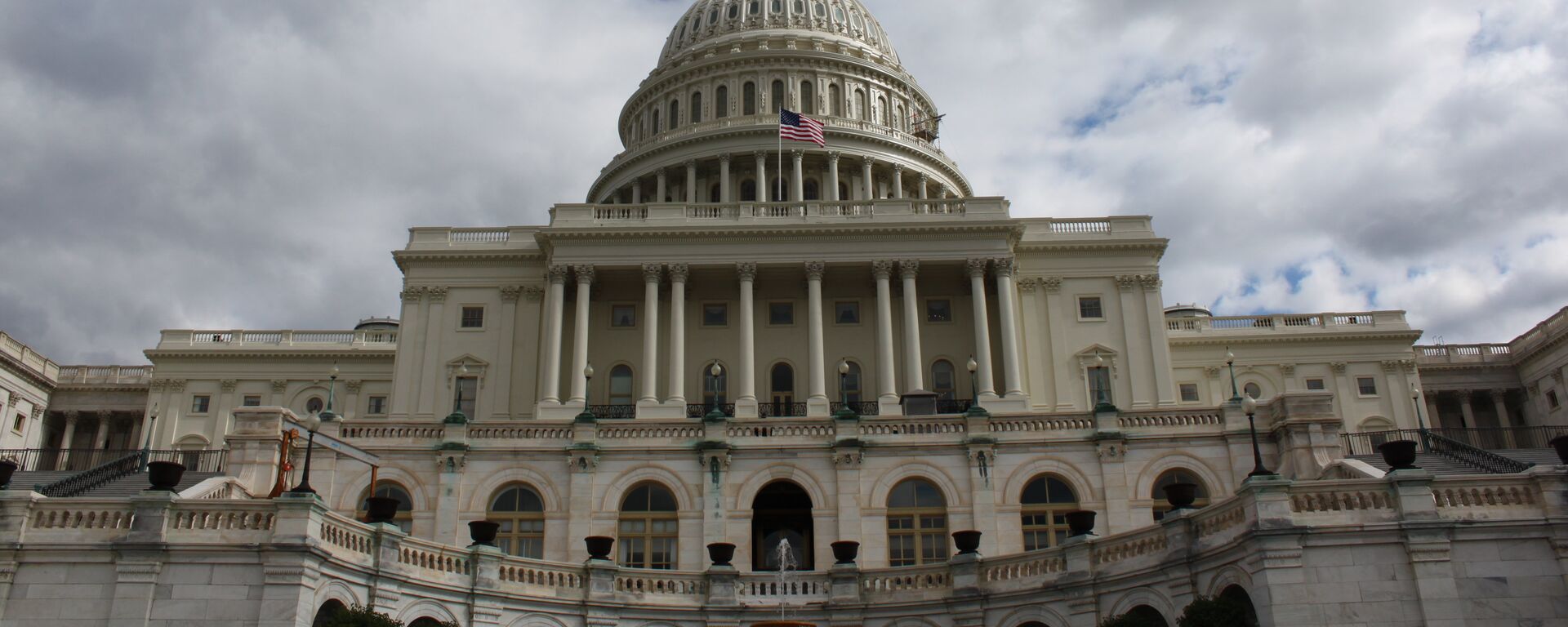https://sputnikglobe.com/20240506/us-senator-criticizes-uniparty-for-borrowing-money-to-finance-war-in-ukraine-1118277076.html
US Senator Criticizes Uniparty for Borrowing Money to Finance War in Ukraine
US Senator Criticizes Uniparty for Borrowing Money to Finance War in Ukraine
Sputnik International
Senator Rand Paul (R-KY) offered criticism of both of the country’s major political parties Sunday in comments expressing concern over bipartisan spending on the US proxy war in Ukraine.
2024-05-06T03:07+0000
2024-05-06T03:07+0000
2024-05-06T03:07+0000
economy
us
rand paul
paul craig roberts
ukraine
russia
china
federal reserve
nato
inflation
https://cdn1.img.sputnikglobe.com/img/07e8/01/09/1116078135_0:160:3073:1888_1920x0_80_0_0_75cf253e3161861f09f2c2ff7b39ffe1.jpg
Senator Rand Paul (R-KY) offered criticism of both of the country’s major political parties Sunday in comments expressing concern over bipartisan spending on the US proxy war in Ukraine.“My primary reason for opposing sending money to Ukraine is that we don’t have any money,” said the libertarian-leaning lawmaker in a radio interview with CEO and talk radio host John Catsimatidis.Observers have long warned of the consequences of deficit spending, which ballooned in the 1980s amid large tax cuts and has continued ever since. The US has traditionally financed its debt by selling treasury bonds to foreign countries, with China becoming one of the largest holders. But in 2008 the US government found itself without sufficient buyers as it responded to the financial turmoil of the Great Recession, spending billions of dollars to bail out the country’s banking system.The Federal Reserve responded to the dilemma by itself buying US Treasuries, with the government printing money to allow the private bank to do so. The strategy has raised significant concerns over the Fed’s “vast expanded powers,” with observers fearing the required money printing will drive inflation.Meanwhile, the dynamic allowing the United States to pursue massive deficit spending – namely the US dollar’s status as the defacto global reserve currency – is increasingly being called into question. Central banks have begun diversifying their holdings away from the dollar as a hedge against the threat of US sanctions and other retaliatory measures, while foreign countries gradually pursue trade denominated in their own currencies.Paul insisted lawmakers should stop funding Kiev’s increasingly quixotic war against Russia, and instead push the country to seek a negotiated settlement to the conflict.“That’s the one thing [NATO membership] that, actually, Ukraine… could negotiate,” said the legislator.The United States intervened to scuttle at least two opportunities to negotiate an end to the war in the Donbass, while also working to undermine the implementation of the so-called Minsk accords in the years prior. Neoconservative commentators have openly promoted the conflict as a way to weaken Russia, with Moscow becoming “bogged down” in fighting in a strategy reminiscent of the Soviet Union’s involvement in Afghanistan decades ago.But Russia has actually grown more resilient in the years since launching its special military operation, becoming more independent from the West, increasing its industrial capacity and expanding its economy. Meanwhile, dollar hegemony has been threatened by the United States’ punitive measures against Moscow, Washington has descended deeper into debt and the NATO military alliance has been revealed to be a paper tiger.These trends suggest it is not Russia that is becoming “bogged down,” but rather the United States as the global hegemon’s position appears more fragile with each passing day.
https://sputnikglobe.com/20231121/federal-reserve-admits-us-inflation-unacceptably-high-after-2-years-of-monetary-tightening-1115116738.html
https://sputnikglobe.com/20160112/federal-reserve-audit-blocked-1033023720.html
https://sputnikglobe.com/20240426/team-trump-seeks-to-stop-de-dollarization-with-new-sanctions-crusade-1118125497.html
ukraine
russia
china
2024
John Miles
https://cdn1.img.sputnikglobe.com/img/07e8/01/19/1116388787_0:0:1316:1316_100x100_80_0_0_77e70d36afd983012b1c5d38ddb84156.jpg
John Miles
https://cdn1.img.sputnikglobe.com/img/07e8/01/19/1116388787_0:0:1316:1316_100x100_80_0_0_77e70d36afd983012b1c5d38ddb84156.jpg
News
en_EN
https://cdn1.img.sputnikglobe.com/img/07e8/01/09/1116078135_171:0:2900:2047_1920x0_80_0_0_80f9972eac906b683ed3482443391e4e.jpg
John Miles
https://cdn1.img.sputnikglobe.com/img/07e8/01/19/1116388787_0:0:1316:1316_100x100_80_0_0_77e70d36afd983012b1c5d38ddb84156.jpg
rand paul borrowing, rand paul spending, rand paul criticizes uniparty, rand paul criticizes ukraine war, rand paul ukraine negotiation, us dollar hegemony, us dollar dominance, us economy ukraine, us deficit spending, federal reserve borrowing, us federal reserve money printing, us hegemony, american dominance, nato’s proxy war, nato proxy war, war in ukraine, ukraine crisis
rand paul borrowing, rand paul spending, rand paul criticizes uniparty, rand paul criticizes ukraine war, rand paul ukraine negotiation, us dollar hegemony, us dollar dominance, us economy ukraine, us deficit spending, federal reserve borrowing, us federal reserve money printing, us hegemony, american dominance, nato’s proxy war, nato proxy war, war in ukraine, ukraine crisis
Senator Rand Paul criticized US deficit spending that funds conflicts in Ukraine, Gaza, and throughout the globe.
“My primary reason for opposing sending money to Ukraine is that we don’t have any money,” said the libertarian-leaning lawmaker in a radio interview with CEO and talk radio host John Catsimatidis.
“The money has to be borrowed,” he continued. “So basically we owe China a trillion dollars, they bought a trillion dollars worth of our debt. We have to basically borrow money from China in order to send it to Ukraine.”
The Federal Reserve responded to the dilemma by itself buying US Treasuries, with the government printing money to allow the private bank to do so. The strategy has raised significant concerns over the Fed’s “vast expanded powers,” with observers fearing the required money printing will drive inflation.
“That’s the one thing [NATO membership] that, actually, Ukraine… could negotiate,” said the legislator.
“If they were willing to negotiate that they would be a neutral country and not allied with the… Russians and not allied with the West but be open to trade with both… that could be negotiated for withdrawal of troops,» he added. «There’s no guarantee the Russians would withdraw troops, but it’d be worth the offer.”
These trends suggest it is not Russia that is becoming “bogged down,” but rather the United States as the global hegemon’s position appears more fragile with each passing day.





